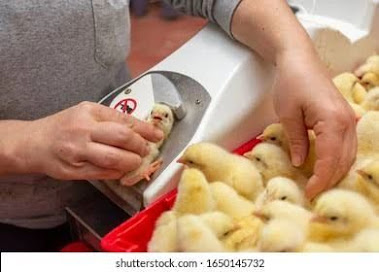Factors that can affect the vaccination of day old chicks
There are several factors that can affect the vaccination of day-old chicks:
1. **Vaccine Quality**:
The quality of the vaccine itself is crucial. It should be stored and handled according to the manufacturer's instructions to maintain its efficacy.
2. **Timing**:
2. **Timing**:
Vaccination should be done at the right time, typically within the first 24-48 hours after hatching to ensure the chicks have a strong immune response.
3. **Stress**:
3. **Stress**:
Stress from various factors such as transportation, handling, or poor environmental conditions can weaken the chicks' immune system and affect the success of vaccination.
4. **Vaccine Administration**:
4. **Vaccine Administration**:
Proper administration techniques are vital. The right dosage, route (e.g., subcutaneous, intramuscular), and location (e.g., wing web, thigh) must be followed.
5. **Sanitation**:
5. **Sanitation**:
Clean and sanitized equipment, as well as the environment, can prevent the spread of diseases that vaccines are meant to protect against.
6. **Maternal Antibodies**:
6. **Maternal Antibodies**:
The level of maternal antibodies passed from the hen to the chick can interfere with vaccine effectiveness. Proper timing is essential to vaccinate when maternal antibodies are at a lower level.
7. **Vaccine Interference**:
7. **Vaccine Interference**:
Some vaccines can interfere with each other if given simultaneously, so a proper vaccination schedule should be followed.
8. **Vaccine Storage and Handling**:
8. **Vaccine Storage and Handling**:
Proper temperature control and storage conditions are crucial to maintain the vaccine's viability.
9 **Chick Health**:.
9 **Chick Health**:.
Only healthy chicks should be vaccinated. Sick or weak chicks may not respond effectively to vaccines.
10. **Vaccine Strain**:
Choosing the right vaccine strain that matches the prevalent field strain of the disease in your area is important for vaccine effectiveness.
11. **Vaccination Equipment**:
11. **Vaccination Equipment**:
Ensure that the vaccination equipment, such as needles and syringes, are clean and not causing any injury to the chicks.
12. **Training**: Those administering the vaccines should be properly trained in vaccination techniques to minimize errors.
12. **Training**: Those administering the vaccines should be properly trained in vaccination techniques to minimize errors.
Content Written by : Agriculturist Md.Rasel Ahmed
B.Sc.In Animal Husbandry (BAU)
Assistant Manager-Production
Nahar Agro Group




Comments
Post a Comment